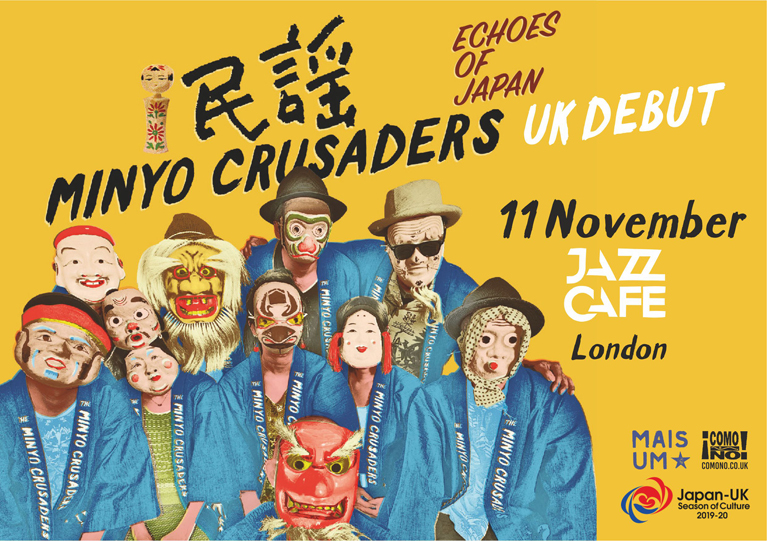
Minyo Crusaders @ Jazz Cafe
- 11 November 2019
- 7pm
- Jazz Café, 5 Parkway, Camden Town, London NW1 7PG
- https://www.comono.co.uk/live/minyo-crusaders/
- - - -
- - - -
- Tweet
The Guardian: “Delightfully quirky album of folk songs reimagined from Afrobeat to reggae”
The Observer: “The focus is on great grooves and fine playing. A band to seek out.”
The Times: “Minyo Crusaders sound like nothing else lurking on your Spotify playlist”
Gilles Peterson: “Fascinating… love this. Thoroughly recommended”
Debut UK live performance from Japan’s Minyo Crusaders - a big band like no other who combine distinctive min'yō vocals with grooves that join the dots between cumbia, Ethiopian jazz, Thai pop, Afro funk and reggae.
The ten-piece who hail from Fussa, western Tokyo, will be playing tracks from their debut album “Echoes of Japan”. Released to acclaim earlier this year via UK label Mais Um, the album had critics spellbound by the band’s unique reworking of historic Japanese folk songs (min'yō) with Latin, African, Caribbean and Asian rhythms.
“For Japanese people, min'yō is both the closest, and most distant, folk music,” explains band-leader Katsumi Tanaka: “We may not feel it in our daily, urban lives, yet the melodies, the style of singing and the rhythm of the taiko drums are engrained in our DNA.”
Although he was initially indifferent to min'yō, a tragic event in recent Japanese history set Tanaka on his current path: “Following the Tohoku earthquake of 2011, I reflected on my life, work and identity. A fan of world music, I began searching for Japanese roots music I could identify with. Discovering mid-late 20th century acts Hibari Misora, Chiemi Eri and the Tokyo Cuban Boys, I was captivated by their eccentric arrangements and how they mixed min'yō with Latin and jazz.”
Originally sung by fishermen (Kushimoto Bushi; Mamurogawa Ondo), coal miners (Tanko Bushi) and sumo wrestlers (Sumo Jinku), these songs deal with topics such as the returning spirits of ancestors (Hohai Bushi), Japan’s smallest bird (Toichin Bushi) and a bride’s undying love for her husband’s pockmarked face (Otemoyan), evoking nostalgia for a forgotten Japan. “As a traditional performing art, min'yō is considered highbrow, yet these are mainly songs for working, dancing or drinking - we want to return them to their literal meaning as ‘songs of the people’ .”
